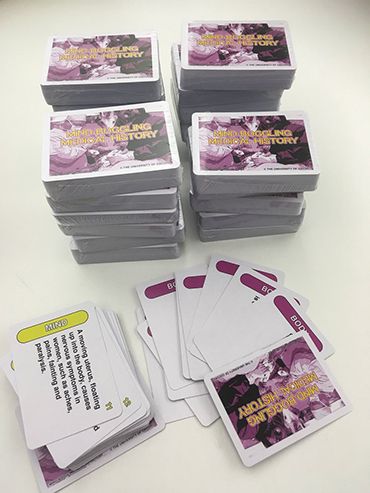Mind-Boggling Medical History
Researchers at Oxford University in partnership with the Royal College of Nursing, have developed a game which helps nurses to develop critical thinking skills and supports evidence-based practice.
 Mind-Boggling Medical History game
Mind-Boggling Medical History gameStatements such as, “women have smaller brains than men” (a concept that on average remains true) spark discussions about how brain size has been used to support pre-conceived ideas about male superiority. The statement, “it is possible to transplant a human head” draws attention to the evolving boundaries between truth and fiction. Whilst most surgeons believe it is impossible to perform a human head transplant, a small group do believe it is possible.
The idea for Mind-Boggling Medical History was originally developed for a public event at the Wellcome Collections, London, in 2013. Creators, Dr Sally Frampton and the RCN’s Dr Sarah Chaney, recognised the potential to develop the game for nurses and secondary school students – to help develop understanding of the history of medicine and support other learning objectives.
Testing at the RCN Congress in 2014 and 2015, demonstrated its value as an educational tool. A grant from the AHRC then allowed Chaney and Frampton to develop and strengthen the resource through consultation with nursing professionals, secondary school teachers and others. Lesson plans, extension activities, and learning objectives were created to support teachers of GCSE History and Science. The game was also tied more directly to the evidence based practice section of the nurse education curriculum.
Modern nurses are expected to keep-up-to-date, think for themselves, and challenge doctors and other healthcare staff. By using medical history to help students examine how the knowledge base for healthcare is constantly changing, the game shows how the humanities can support the notion of evidence-based practice – contributing to good nurse education and high-quality healthcare.
Mind-Boggling Medical History launched in February 2018 with a physical card pack as well as an online version. Nurse educators, public health specialists, secondary school teachers, NHS library staff and museum professionals are now using the resource with students across the UK. And Oxford University Innovation (a technology transfer company owned by Oxford University), is working with Dr Frampton to license the game to global board games providers, further extending its public reach.
Funded by Arts and Humanities Research Council